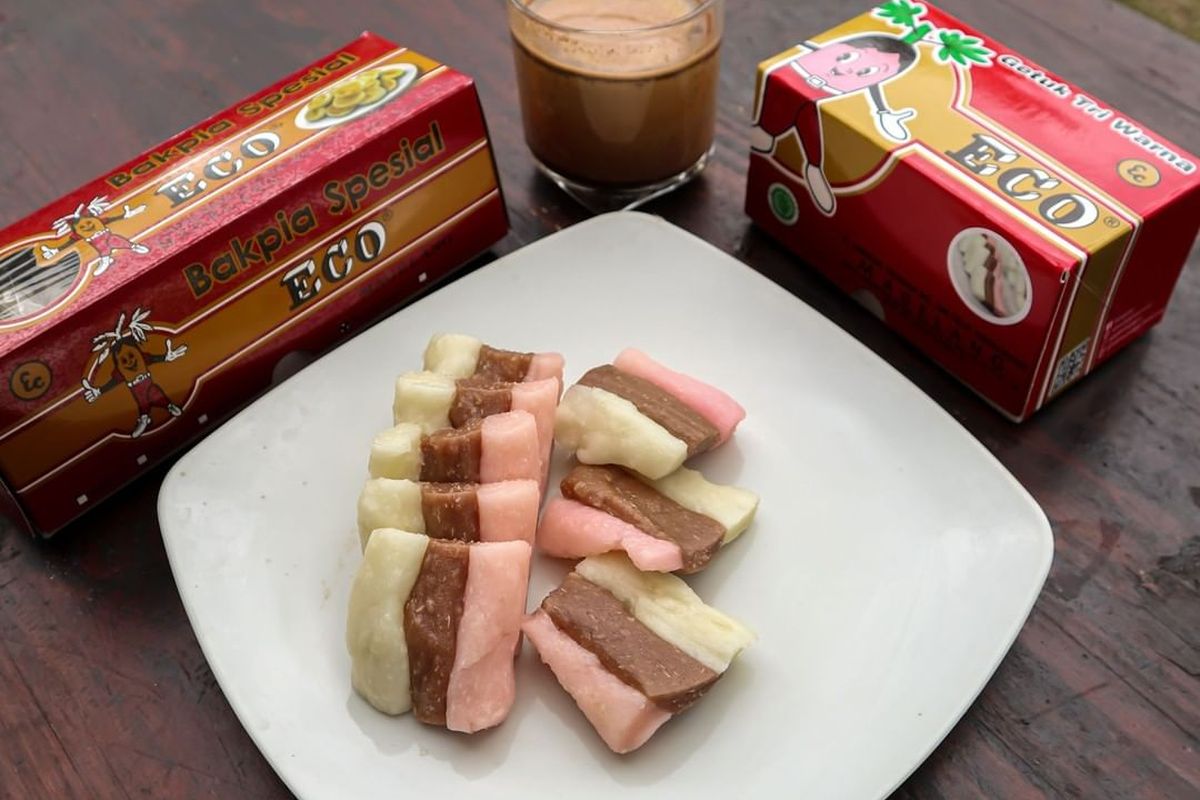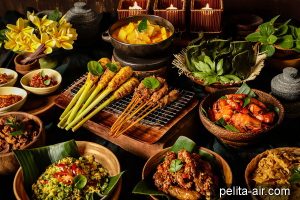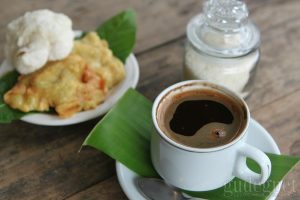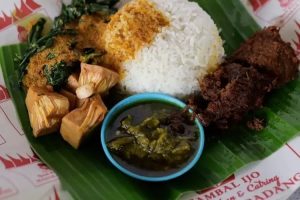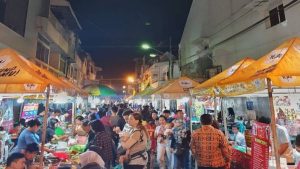6. Dodol
What is Dodol?
Dodol is a sweet, sticky toffee-like candy that’s a popular treat in Indonesia, particularly during festive seasons like Eid. Made from coconut milk, sugar, and glutinous rice flour, dodol has a chewy, caramelized texture that melts in your mouth. Its sweetness and richness make it a beloved snack for locals and an ideal souvenir for travelers.
Regional Variations of Dodol
While dodol is enjoyed across Indonesia, each region has its own unique twist on this traditional treat. For example, Dodol Garut, from West Java, is the most famous and often comes in a variety of flavors, such as durian, pandan, and vanilla. Dodol Betawi, from Jakarta, is made with a thicker consistency, while Dodol Bali may feature local fruits and spices like mango or cinnamon, offering a distinct taste of the island.
Best Places to Buy Dodol as a Souvenir
You can find dodol in local markets or shops selling traditional snacks in major cities like Jakarta and Bandung. For an authentic experience, head to Garut in West Java, where the candy is made in large quantities and sold in specialty shops. Dodol is often packaged in colorful wrappers, making it easy to bring back as a gift or treat.
7. Indonesian Spices and Sauces
The Richness of Indonesian Spices
Indonesian cuisine is a rich tapestry of flavors, and one of the key elements that make it so special is the use of spices. From turmeric and coriander to cumin and lemongrass, Indonesian dishes are infused with aromatic spices that give them their signature taste. These spices are often sold in bulk or in pre-mixed packages, making them a great way to take home a piece of Indonesia’s culinary tradition.
Popular Spices to Bring Home
Some of the most popular Indonesian spices that make for great souvenirs include curry powder, sambal (chili paste), balinese spice mixes, and clove (Indonesia is one of the world’s largest producers of cloves). If you’re a fan of cooking, consider picking up some kemiri (candlenuts) or kencur (aromatic ginger), two spices that are frequently used in traditional Indonesian dishes like rendang or sate.
Traditional Sauces as Souvenirs
Indonesian sauces like sambal (a spicy chili paste) and kecap manis (sweet soy sauce) are popular souvenirs to bring back. These sauces are essential ingredients in many Indonesian dishes and can be easily found in supermarkets and local stores. Their intense flavors can bring the taste of Indonesia to your home kitchen and remind you of your travels.
8. Batik-painted Wooden Items
The Art of Batik on Wood
In addition to fabric, batik can also be found on wooden items like trays, boxes, coasters, and wall hangings. The art of painting batik designs on wood offers a unique twist on traditional batik, resulting in beautiful, handcrafted items that make great souvenirs. These pieces often incorporate symbolic patterns that represent the culture, nature, or spiritual beliefs of the region.
What Wooden Items to Buy
Popular wooden batik items include jewelry boxes, photo frames, chess boards, and serving trays. These items are not only functional but also serve as beautiful decorative pieces. Many of these batik-painted wooden items are sold in Bali, Yogyakarta, and other major tourist destinations, where you can find an assortment of designs ranging from traditional motifs to more modern interpretations.
Where to Find the Best Batik Wooden Products
To find high-quality batik-painted wooden items, visit artisanal markets or specialty shops in places like Ubud (Bali) or Yogyakarta. These areas are known for their vibrant art scenes and craftsmanship, where you can purchase handmade, one-of-a-kind batik pieces from local artists.
9. Wayang Kulit (Shadow Puppets)
History and Cultural Significance of Wayang Kulit
Wayang Kulit, the traditional Indonesian shadow puppetry, is a centuries-old art form that tells stories through intricately crafted leather puppets. These puppets are used in performances where they are held against a backlit screen, casting intricate shadows that are part of Indonesia’s rich cultural storytelling tradition. The stories are often based on Hindu epics like the Mahabharata and Ramayana.
Types of Wayang Kulit Puppets
There are two main types of Wayang Kulit puppets: the Wayang Purwa (the traditional form) and Wayang Klithik (a more modern version). The Wayang Purwa puppets are typically made from cowhide, with intricate detailing and sometimes adorned with gold paint. Each puppet represents a specific character, and the detailed carvings reflect both the mythology and artistry of the performer.
How to Choose Authentic Wayang Kulit Puppets
When buying Wayang Kulit puppets, look for authenticity in the craftsmanship. Genuine puppets are made from high-quality leather, with intricate designs carved by hand. Be wary of mass-produced replicas that lack the finesse of traditional handmade puppets. Authentic Wayang Kulit puppets are often sold at cultural markets, traditional art shops, and galleries in Yogyakarta, Solo, and Bali.
10. Keris (Traditional Sword)
What is a Keris?
The keris is a traditional weapon that holds great cultural significance in Indonesia. This unique sword or dagger is characterized by its wavy blade and ornate handle, often decorated with gold or intricate woodwork. Historically, the keris was not only used for combat but also as a spiritual and ceremonial object, believed to possess magical or protective powers.
The Cultural Importance of Keris in Indonesia
The keris is more than just a weapon; it is considered a symbol of power, status, and spirituality. It is often associated with Javanese and Balinese nobility, where it played a key role in royal rituals and ceremonies. Many keris are passed down through generations, often viewed as heirlooms that carry ancestral significance.
Where to Find Genuine Keris Souvenirs
To find authentic keris, visit local markets or specialized shops in Yogyakarta, Solo, and Bali, where skilled artisans craft these traditional weapons. While many keris are made for collectors, it’s important to ensure you are purchasing a genuine, ethically sourced piece. Keep in mind that exporting a keris may require specific paperwork, depending on your destination.
Conclusion
Indonesia’s diverse cultural heritage is beautifully reflected in its wide array of oleh-oleh (souvenirs). From intricate batik fabrics to delicious dodol candies, each souvenir captures the essence of the country’s rich traditions, craftsmanship, and history. By bringing home these unique items, you carry with you a piece of Indonesia’s vibrant culture, which is sure to spark memories of your travels for years to come.
Whether you’re a fan of traditional crafts, exotic spices, or delicious local treats, there’s a perfect oleh-oleh waiting for you in Indonesia. As you explore the islands, remember to take the time to seek out these distinctive souvenirs and support the talented artisans who keep these traditions alive.
5 Unique FAQs
-
What are the most unique souvenirs to bring from Indonesia?
- Some of the most unique Indonesian souvenirs include batik fabrics, Keris swords, and Wayang Kulit puppets, all of which carry significant cultural meaning and craftsmanship.
-
Are there any restrictions on bringing souvenirs like Keris or Dodol into my home country?
- While most Indonesian souvenirs are safe to bring home, items like Keris may require specific documentation or clearance for export, depending on your country’s customs regulations.
-
How do I know if a souvenir is authentic or a tourist replica?
- Look for craftsmanship details, ask the seller about the item’s origin, and buy from reputable markets or artisan cooperatives to ensure authenticity.
-
Can I find Indonesian souvenirs in international airports?
- Yes, many Indonesian international airports offer a selection of souvenirs such as batik clothing, Kopi coffee, and local snacks. However, these items may be more expensive than in local markets.
-
What are some budget-friendly souvenir options from Indonesia?
- If you’re looking for affordable souvenirs, consider buying small items like spices, sambal sauces, or hand-painted wooden trinkets, which are both budget-friendly and meaningful.

